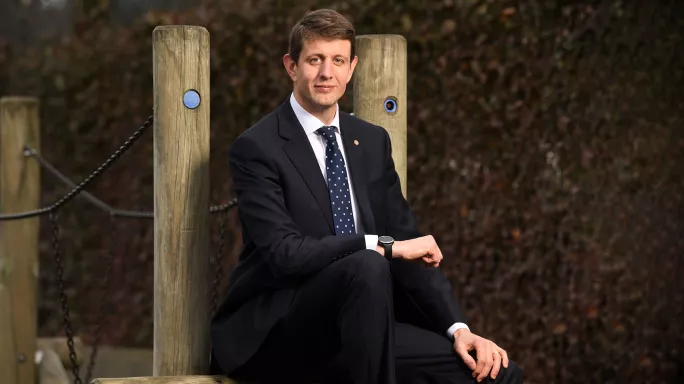John Barneby on the rise of the ‘outsider’ trust CEO

John Barneby, the new CEO of Oasis Community Learning, has never been a teacher. He has never been a headteacher, either. And he thinks we’re going to have to get used to CEOs like him, with a similar “non-school based” background in education.
“I do see a world where chief executives of trusts will have different backgrounds,” he explains. “I think when you’re running a £250 million organisation, there’s a different skill set to running that and to developing the systems and culture that you need for these organisations to move forward.”
Unlike some other “outsider” CEOs in the system who come straight from industry into the top job, though, Barneby is part of an increasingly common breed of trust leader who has climbed the ladder via the trust services route. This new type of CEO typically moves from an HR, finance or operations role in the trust into the CEO position.
Barneby is now the highest-profile example of this route, so what he does next will be pivotal in how it is viewed, and whether we develop it more systematically. Is he aware of that pressure?
“I believe that anyone who takes on the role of a CEO naturally experiences a healthy level of pressure,” Barneby explains.
“The responsibilities we carry as leaders in education are significant…This intrinsic pressure, driven by the profound significance of our role, is what makes this more of a lifelong mission than a job.”
- Background: Oasis MAT appoints new chief executive
- Oasis: How one academy trust rolled out iPads across its 52 schools
- Steve Chalke: Oasis charity head calls for Covid plan for schools
Barneby is keen to stress that those with his background should not actually be seen as “outsiders”. Far from being removed from schools and their needs, he says the trust roles those like him have worked in give a thoroughly immersive experience in school life and the sector more broadly.
Indeed, Barneby has been involved with the academies movement right from the start. He gave up a well-remunerated role providing IT services to education as an employee of European Electronique to work in-house at Oasis as head of group IT services in 2008.
“Something felt right [in the decision to move], even though it was challenging to give up wonderful expenses and company cars and a career that was going really well,” he says.
Barneby describes those early days of the academies system as “the Wild West of the education sector”.
“There was an idea about how it was going to work, but there weren’t really any clear rules or frameworks for how these organisations were going to start running these schools. I think everyone was working it out as they went,” he says.

Fast forward to the present day and Barneby has 15 years at Oasis under his belt, working as head of group IT services for six years, then chief operating officer between 2014 and 2023, before finally rising to the top job.
Since Oasis opened the doors of its first academies in 2007, the trust has grown to 54 primary and secondary schools to date.
Today, Barneby explains, Oasis “addresses over twice the national disadvantage rate” and provides “targeted support for vulnerable students, wrap-around community services and quality pastoral care”.
While he clearly feels well-equipped to take on the challenge of running the trust, he does admit the rise to the top came slightly more quickly than he anticipated.
When the trust’s former CEO John Murphy took Barneby for a drink one evening last year and divulged that he was stepping down, Barneby was “shocked”. While he had aspired to become a trust CEO at some point, he believed he had at least a few more years until he’d have to think about it.
Barneby stepped into the interim role, but he was aware that his competition for the permanent job would mostly be those with a more traditional background of working in schools. Such is the weighting put on school experience, he seemed to have resigned himself to losing out.
A MAT ‘isn’t just a family of schools’
“Clearly the sector is fairly small, so I heard some rumours about people that might be applying to it. I knew that some of those were experienced leaders and had run other multi-academy trusts (MATs) successfully. I thought I probably wouldn’t get it,” he says.
However, on 14 December last year, he got the nod.
“It was definitely an emotional moment,” Barneby admits. “I felt excited but also very humbled to have the opportunity to lead this amazing organisation.”
Oasis certainly felt like Barneby was up to the job. But did Steve Chalke - founder of the Oasis Charitable Trust - ever have any reservations about the new CEO’s ability, especially regarding his lack of school experience?
“Not in the least,” Chalke tells Tes. He explains that a MAT “isn’t just a family of schools”, rather it’s an organisation “that needs to be coordinated”.
The Oasis founder says that one of his critiques of the MAT system is that “it’s easy to think it is just about running a family of schools”.

“Being a CEO isn’t just being a super head,” Chalke concludes. “We think this is the way forward for big MATs.”
While Chalke himself has no fears about Barneby’s background, does Barneby himself feel like he will need to convince the Oasis staff, and the wider sector, that he is the right man for the job?
“I feel like I have been up a route in education,” he argues. “While I haven’t necessarily held those posts [teacher or head], I have a very good understanding of what life is like in a school.”
However, he is also keen to flip the narrative and make the case that his different route to the top is actually an asset - that those like him are a way of bringing necessary diversity to schools.
Ultimately, he says his job is to understand what’s going on in his staff’s world, making sure that there is adequate capacity and resources in place for them.
Utilising skills and knowledge
He points to the fact that large MATs are relatively new to the sector, and so “all of us are relatively new to trying to run these large organisations”.
“I think there are, undoubtedly, things that we can learn from people that have grown up in large organisations that have spent billions and billions of pounds of budgets to actually work out how to do things really efficiently and effectively.”
Barneby says that some of the operational functions like estates, finances or internal communications are a “really big challenge”. But he believes that his expertise gives him an upper hand.
Such is the advantage those who have grown up in the trust services can bring, he believes we will see more and more of them organically, but he says we should be nurturing these pathways, too.
He says it is vital that there are programmes that develop people in the sector and that “allow people to come in from outside of the sector”.
“I think it is that balance. There is so much brilliant expertise in the sector. And there are so many brilliant people who I think are looking for more purpose in their life that we could utilise some of their skills and knowledge in the sector.”
The future of Oasis
So, should we expect big changes to the way Oasis is run, considering his faith in the new perspective those like him can bring?
The answer appears to be “not yet”. Barneby says the trust has launched a fair few programmes and initiatives over the last five years, and he thinks it’s time to let his staff breathe and allow full implementation. He is very much in “listening mode”.
But there are several things that Barneby tells Tes he is thinking seriously about: mental health and the state of the country’s alternative provision, something he says is a “massive issue”. He argues there “just isn’t enough capacity in the system” and the result is helping neither the student nor the school.
And what about the future landscape of the sector? Does Barneby think that all local-authority-maintained schools will ultimately have to be absorbed by the trust system?
“If [the government] continues to treat local authorities in this way, then I think all schools will end up in MATs because the benefits to staff and children will be greater than the benefits of being in the LA and therefore it will make sense.”
Glimmer of hope
Ultimately, unless money is put into the local education system, people “will have to join MATs”, he says bluntly.
While Barneby still feels there is a long way to go in the evolutionary journey of the trust system, and the end is not yet in sight, there does appear to be a glimmer of hope.
Returning to his earlier metaphor for describing the early days of the academies system, Barneby says: “We’ve come out of the Wild West and we’ve built some railways now.”
How well-placed and serviced those tracks will be, and how much attention the next government wants to put on extending them, however, will be down in large part to what CEOs do next.
How different will Barneby’s approach be compared with his peers due to his different route up? We’ll soon see.
For the latest education news and analysis delivered directly to your inbox every weekday morning, sign up to the Tes Daily newsletter
You need a Tes subscription to read this article
Subscribe now to read this article and get other subscriber-only content:
- Unlimited access to all Tes magazine content
- Exclusive subscriber-only stories
- Award-winning email newsletters
Already a subscriber? Log in
You need a subscription to read this article
Subscribe now to read this article and get other subscriber-only content, including:
- Unlimited access to all Tes magazine content
- Exclusive subscriber-only stories
- Award-winning email newsletters



